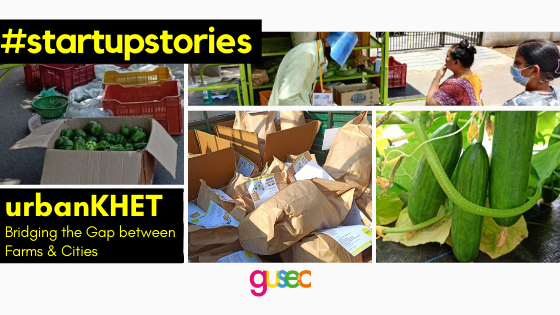The Startup Story of urbanKHET, Connecting Farms and Cities, Delivering Farm-Fresh Vegetables

In a conversation with Priyam Sameer, founder of UrbanKHET, we look at what forced an aspiring civil engineer off the beaten path.
“I always wondered why food, which has proven to be an ‘essential commodity’, especially in trying times like these, is not at the centre of town planning”, Priyam says. “We can survive without a lot of things, but not food. Then why is it that food is grown thousands of kilometres away from cities, not in the midst of it?” he contemplates. With that vision, he founded UrbanKHET, an organization that not just brings fresh crops closer to urban homes, but also emancipates farmers by giving them better earning opportunities.
Growing up, Priyam always had the penchant for innovation, which reflects in the fact that he liked to open his battery-operated toys to see what made them tick, and repair mobile phones in high school. While in college, the thought of not being able to finish college always gripped him, which is when he started to apply for internships that piqued his interest. It was during one such internship at a Canadian agro-based industry in Bangalore that he was introduced to the concept of aquaponics – which made him develop a deeper interest in the agriculture ecosystem. Seeing his keenness at the same prompted the CEO of the company, who happened to be visiting India at the time, to personally mentor Priyam. This sparked the fire which later led Priyam to lay the foundations of UrbanKHET during his third year of engineering.
Initially, the only funds UrbanKHET could garner were from Priyam’s own pocket, which was what he received as hostel money his parents sent him; but getting incubated at GUSEC took care of his financial hindrances and helped him get established in the startup ecosystem. Even though the money trickled in with time, he made good connections with vendors and established his identity in the farmer market. Under UrbanKHET, farmers sort and package the freshly harvested produce themselves, eliminating middlemen that lead to price inflation, and enabling farmers to generate 20-50% more income than they usually do.
When the pandemic first began, it urged Priyam to mull over how he could add value and help people have better access to essential food items which UrbanKHET could facilitate. He emailed the Deputy Commissioner of Ahmedabad about the same, asking him if there was any way he could add value. Surprisingly, the Deputy Commissioner only emailed him hours later, advising him to first run a pilot and take things forward from there. UrbanKHET in close nexus with the Ahmedabad Municipal Corporation serves about 100 customers every day. Priyam remarks that he never expected cooperation from the government, but praises them for their support.
When asked what keeps him going, and why he decided to start an agro-based venture, Priyam says, “Agriculture is a deep bottleneck in this country. India fast-forwarded through all industrial revolutions, and nobody cares about the farmers. We’ve taken food for granted.” He believes that the roadmap of a startup should focus on the problem they’re trying to solve, not the number of people they serve, and he wants to work towards averting the food crisis that might loom in the coming times. “Everyone migrated to cities for better work opportunities. I want people to think of an agro-based career and make it as sought after as hospitality or real estate.”
He says that the impact that UrbanKHET generates keeps him motivated to work. “It makes farmers think that someone is thinking about them.” He also points as to why now, more than ever, people should start paying attention to agriculture. “This pandemic is a good lesson to people about how food-centric we are, and if not taken care of, it will be way harder to solve than COVID.”
Want to know what we’re up to? Subscribe to our newsletter.
